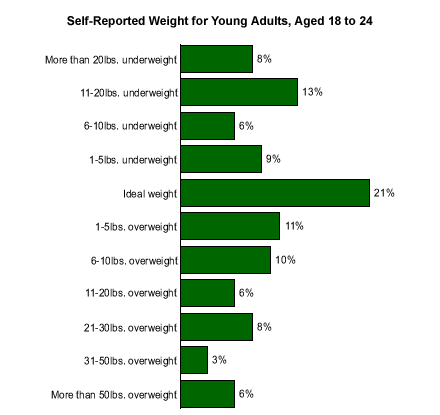Last week, a group of lawyers filed a class-action lawsuit against McDonald's. The suit is on behalf of two young New Yorkers who have, the lawyers claim, been harmed by the restaurant chain. The two teens, aged 19 and 14, haven't burned their tongues on hot French fries or failed to be cheered by Happy Meals. According to the suit, they have suffered more insidious harm -- diabetes, high blood pressure, and obesity -- as a result of eating too much fast food. The suit may or may not be frivolous, and McDonald's may or may not have anything to be worried about. But one fact remains -- young people are getting fatter, and recent Gallup data collected from young U.S. adults suggest that the poor eating habits kids are developing may stay with them into adulthood.
How Many Young Adults Are Underweight?
A November Gallup survey* asked, "What do you think is the ideal body weight for you, personally?" Respondents were also asked to report their current weight. Comparing the results of the two questions gives a sense of how Americans' current weights compare with their ideal weights.
Weight-related health problems can work both ways -- being underweight can be as dangerous as being overweight. No surprise, the youngest adults are the most likely to be underweight -- 35% are under their ideal weight (including 26% who are more than 5 pounds below their ideal weight). The ranks of the underweight decline precipitously with increasing age, only 11% of 30- to 49-year-olds are more than 5 pounds below their ideal weight, and only as many as 6% in any other age category fall into this weight range.
How Many Are Overweight?
Despite the significant number of young Americans who are underweight, like most adults, there are more in this age group who say their current weight is higher than their ideal weight, 44%, including 33% who are more than 5 pounds over their ideal weight. However, the 44% who weigh more than their ideal weight is small compared to all other age categories. Roughly 6 in 10 Americans in all other age groups weigh more than their ideal weight.
How Many Are the Right Weight?
Forty-one percent of 18- to 24-year-olds say they are within 5 pounds of their ideal weight, and 21% say their ideal weight matches their current weight. This compares favorably to all other age categories. About the same percentage of those between the ages of 25 and 34 (20%) and 65 and older (60%) say they are currently at their ideal weight, but fewer Americans between the ages of 35 and 55 are. Thirty-seven percent of 25- to 34-year-olds are within 5 pounds of their ideal weight, as are 34% of 35- to 44-year-olds and 45- to 54-year-olds, 28% of 55- to 64-year-olds and 40% of those 65 and older say their current weight is the same as their ideal weight.
Looking more generally, the average 18- to 24-year-old says they are 4.8 pounds heavier than their ideal weight, which is much lower than that for any other age category, for which the averages range from 13.6 pounds overweight (for those 65 and older) up to 21.5 pounds overweight (for those aged 55 to 64).
The poll also asked Americans to describe their weight situation as "overweight," "about right," or "underweight." Though the results differ somewhat when compared to the ideal/current weight comparisons, the results still show that younger adults are most likely to see themselves as at about the right weight (65%, compared to 58% of 25- to 34-year-olds, about half of 35- to 44- year-olds and 65 and older, and only 4 in 10 45- to 64-year-olds). Also, just 22% of 18- to 24-year-olds say they are overweight, by far the lowest of any age category. In fact, 55% of those between the ages of 45 and 64 say they are overweight, more than double that in the 18-to-24 age category.

Healthy Weight
So, what is the "ideal" weight that so few people have achieved? The structure of the question allowed respondents to decide for themselves. According to the U.S. Department of Health and Human Services, a healthy weight depends on one's Body Mass Index (BMI), a number that correlates total body fat content and height. The Gallup data indicate that the rest of us should probably be aware of our BMIs, especially as we age.
*Results are based on combined data from telephone interviews with 1,001 national adults, aged 18 and older, conducted Nov. 11-14, 2002, and 1,005 national adults, aged 18 and older, conducted Nov. 8-11, 2001. For results based on the total sample of national adults, one can say with 95% confidence that the maximum margin of sampling error is ±2%.